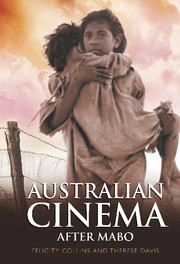Book contents
- Frontmatter
- Contents
- Acknowledgments
- Part 1 Australian Cinema and the History Wars
- Part 2 Landscape and Belonging after Mabo
- 5 Aftershock and the Desert Landscape in Heaven's Burning, The Last Days of Chez Nous, Holy Smoke, Serenades, Yolngu Boy, The Missing
- 6 Coming from the Country in Heartland, Cunnamulla and Message from Moree
- 7 Coming from the City in The Castle, Vacant Possession, Strange Planet and Radiance
- Part 3 Trauma, Grief and Coming of Age
- Bibliography
- Index
5 - Aftershock and the Desert Landscape in Heaven's Burning, The Last Days of Chez Nous, Holy Smoke, Serenades, Yolngu Boy, The Missing
Published online by Cambridge University Press: 31 January 2011
- Frontmatter
- Contents
- Acknowledgments
- Part 1 Australian Cinema and the History Wars
- Part 2 Landscape and Belonging after Mabo
- 5 Aftershock and the Desert Landscape in Heaven's Burning, The Last Days of Chez Nous, Holy Smoke, Serenades, Yolngu Boy, The Missing
- 6 Coming from the Country in Heartland, Cunnamulla and Message from Moree
- 7 Coming from the City in The Castle, Vacant Possession, Strange Planet and Radiance
- Part 3 Trauma, Grief and Coming of Age
- Bibliography
- Index
Summary
The impetus for this chapter comes out of a particular viewing experience which we are calling ‘aftershock’. For us, this experience is associated with the unbearable weight of history embedded in the Australian landscape film of the 1990s. The landscape cinema of the 1970s established Australian film as an international genre. The ‘AFC genre’, as it was christened by Susan Dermody and Elizabeth Jacka, was defined by the period film which became the flagship of an inward and backward-looking national identity through quality films like Sunday Too Far Away (Ken Hannam, 1975), Picnic at Hanging Rock (Peter Weir, 1975) and My Brilliant Career (Gillian Armstrong, 1979). However, after a decade of official support through the Australian Film Commission, the period film was repudiated as the nation's standard-bearer during the commercially oriented 1980s, particularly after the first two Mad Max films (George Miller, 1979, 1981) reclaimed the landscape for a contemporary, outward-looking cinema. The cinematic landscape has re-emerged as a more complex figure of national identity in the 1990s, after the High Court ended the nation's sustaining myth of terra nullius.
Writing about the landscape tradition in Australian feature films of the 1970s, Ross Gibson argues that ‘the majority of Australian films have been about landscape’. They participate fully in the 200-year-old landscape tradition whereby non-Aboriginal Australia, ‘underendowed’ with myths of belonging, tried ‘to promote a sense of the significance of European society in the antipodes’.
- Type
- Chapter
- Information
- Australian Cinema After Mabo , pp. 75 - 93Publisher: Cambridge University PressPrint publication year: 2004



